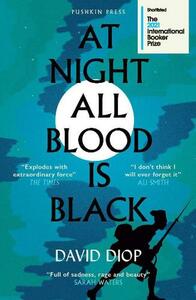Take a photo of a barcode or cover
adventurous
challenging
dark
sad
tense
medium-paced
Powerful story, beautifully written. I felt deeply for the main character and his more-than-brother. Very glad i found this story in my library.
My only criticism: i felt the pace in the middle dragged too much, especially after the action in the first half. I enjoyed the repetitive writing in the first and last part, where it read as more poetic. That style was less flowing in the middle and added to the dropped pace of the story.
Tho on reflection that slowed pace might have been intentionalas it coincided with Alfa being sent off the front lines and suddenly out of the chaos of battle .
My only criticism: i felt the pace in the middle dragged too much, especially after the action in the first half. I enjoyed the repetitive writing in the first and last part, where it read as more poetic. That style was less flowing in the middle and added to the dropped pace of the story.
Tho on reflection that slowed pace might have been intentional
Graphic: Body horror, Death, Gore, Racism, Torture, Violence, Blood, Grief, Murder, War
Moderate: Body shaming, Sexual content, Abandonment, Colonisation
Minor: Rape
I have almost no words. The ability to fit so much in so little left me whiplashed and breathless. Gorgeous translation. 5/5
emotional
sad
slow-paced
Par la vérité de Dieu, toute chose porte en elle son contraire. Jusqu’à la troisième main, j’étais un héros de guerre, dès la quatrième je suis devenu un fou dangereux, un sauvage sanguinaire. Par la vérité de Dieu, ainsi vont les choses, ainsi va le monde : toute chose est double.
If the idiocy that's happening in the US now about teaching history as history truths wasn't a thing, we wouldn't need monsters like this.
This is a great book about a great war and the effect it has on human beings. It also gives a voice to the often forgotten soldiers of the First World War. The men who came from the colonies of Britain and - in this case - France to fight and die for their 'homeland.'
Sometimes it reads like a poem with repetition of words, phrases, events and thoughts. Sometimes it is utterly horrific.
The narrator, Alfa Ndiaye, is from Senegal. He and his friend Mademba Diop are in France fighting against the Germans. The story begins with the brutal death of Mademba Diop and the effect it has on Alfa Ndiaye. How it opens his mind to thoughts he would not have thought before and how he realises that his actions after Mademba Diop's death change how he is seen by his fellow soldiers - both white and black.
He is aware that :
"The captain's France needs for us to play the savage when it suits them. They need for us to be savage because the enemy is afraid of our machetes."
He knows that a kind of temporary madness is necessary for the battlefield if a soldier is to be able to do his job, but Alfa Ndiaye is also aware that what he is becoming is something darker. Is it madness? He certainly seems to have an effect on his fellow soldiers who, gradually, withdraw from him as the days pass. His fellow African soldiers start to talk about him as a dëmm - a taker of souls. But the French are afraid of him too.
Alfa Ndiaye also feels guilt for his Mademba Diop's death:
"I have come to understand that it wasn't the blue-eyed enemy from the other side who killed Mademba. It's me."
Alfa Ndiaye is unravelling. The book jumps back and forth in time as he re-visits his childhood and youth. How he grew up and his relationship with Mademba Diop but all the time there is a tension in the writing. As if we are waiting for something terrible to happen. Or more terrible than what has already happened.
This book reminded me of Chinua Achebe's 'Things Fall Apart', but perhaps the book it reminded me of most was 'Ceremony' by Leslie Marmon Silko. This deals with a different war, World War Two, and a Native American's post-war breakdown. 'Ceremony' though is less bleak. It is, after all, as much a story of recovery as of breakdown.
David Diop has written a great book, although greatness is measured not just in the here and now but in the longevity of a story. I think this one will last, but what do I know as a small-time amateur reviewer.
Its subject matter makes it a hard book to read but if you are going to read modern books about World War One then I'd make this as essential a read as Pat Barker's 'Regeneration'. I'd also recommend reading David Olusoga's 'The World's War: Forgotten Soldiers of Empire' alongside it to give you a historical insight into the experience that David Diop is fictionalising.
The translation by Anna Moschovakis helps make this a memorable read. It feels like a surviving extract from some lost epic poem or a story that is told around campfires.
Towards the end, indeed, David Diop talks about stories as Alfa Ndiaya tells one - a story within a story - and at one point he says: "Princes, like wrestlers, always have scars. It's their scars that tell their stories." And it seems to me that Alfa Ndiaya's story scar is mental and not physical. It is his friend's death that scars him.
Sometimes it reads like a poem with repetition of words, phrases, events and thoughts. Sometimes it is utterly horrific.
The narrator, Alfa Ndiaye, is from Senegal. He and his friend Mademba Diop are in France fighting against the Germans. The story begins with the brutal death of Mademba Diop and the effect it has on Alfa Ndiaye. How it opens his mind to thoughts he would not have thought before and how he realises that his actions after Mademba Diop's death change how he is seen by his fellow soldiers - both white and black.
He is aware that :
"The captain's France needs for us to play the savage when it suits them. They need for us to be savage because the enemy is afraid of our machetes."
He knows that a kind of temporary madness is necessary for the battlefield if a soldier is to be able to do his job, but Alfa Ndiaye is also aware that what he is becoming is something darker. Is it madness? He certainly seems to have an effect on his fellow soldiers who, gradually, withdraw from him as the days pass. His fellow African soldiers start to talk about him as a dëmm - a taker of souls. But the French are afraid of him too.
Alfa Ndiaye also feels guilt for his Mademba Diop's death:
"I have come to understand that it wasn't the blue-eyed enemy from the other side who killed Mademba. It's me."
Alfa Ndiaye is unravelling. The book jumps back and forth in time as he re-visits his childhood and youth. How he grew up and his relationship with Mademba Diop but all the time there is a tension in the writing. As if we are waiting for something terrible to happen. Or more terrible than what has already happened.
This book reminded me of Chinua Achebe's 'Things Fall Apart', but perhaps the book it reminded me of most was 'Ceremony' by Leslie Marmon Silko. This deals with a different war, World War Two, and a Native American's post-war breakdown. 'Ceremony' though is less bleak. It is, after all, as much a story of recovery as of breakdown.
David Diop has written a great book, although greatness is measured not just in the here and now but in the longevity of a story. I think this one will last, but what do I know as a small-time amateur reviewer.
Its subject matter makes it a hard book to read but if you are going to read modern books about World War One then I'd make this as essential a read as Pat Barker's 'Regeneration'. I'd also recommend reading David Olusoga's 'The World's War: Forgotten Soldiers of Empire' alongside it to give you a historical insight into the experience that David Diop is fictionalising.
The translation by Anna Moschovakis helps make this a memorable read. It feels like a surviving extract from some lost epic poem or a story that is told around campfires.
Towards the end, indeed, David Diop talks about stories as Alfa Ndiaya tells one - a story within a story - and at one point he says: "Princes, like wrestlers, always have scars. It's their scars that tell their stories." And it seems to me that Alfa Ndiaya's story scar is mental and not physical. It is his friend's death that scars him.
challenging
dark
medium-paced
Plot or Character Driven:
Character
Strong character development:
Complicated
Loveable characters:
No
Flaws of characters a main focus:
Yes
dark
slow-paced
Plot or Character Driven:
Character
Strong character development:
Complicated
Loveable characters:
No
Diverse cast of characters:
Yes
Flaws of characters a main focus:
Complicated
This book is definitely intense, be careful before reading. I was not expecting the ending choices he makes. It does dive into the complexities of PTSD of soldiers during the war in a very interesting way. It is extremely repetitive. If I had to read the phrase “God’s truth” one more time I might have succumbed to madness myself.
challenging
dark
sad
slow-paced
Plot or Character Driven:
Character
Strong character development:
Complicated
Loveable characters:
No
Diverse cast of characters:
No
Flaws of characters a main focus:
Yes








